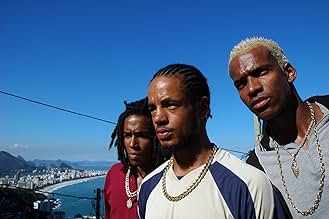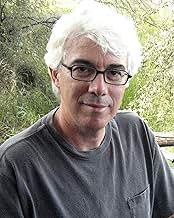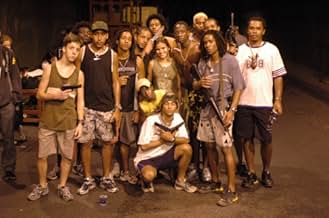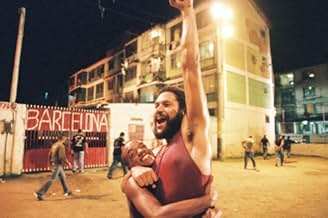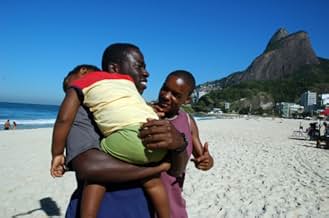PUNTUACIÓN EN IMDb
7,2/10
17 mil
TU PUNTUACIÓN
Los mejores amigos Acerola y Laranjinha, descubren cosas sobre el pasado de sus padres desaparecidos que harán añicos su sólida amistad, en medio de una guerra entre bandas de narcotraficant... Leer todoLos mejores amigos Acerola y Laranjinha, descubren cosas sobre el pasado de sus padres desaparecidos que harán añicos su sólida amistad, en medio de una guerra entre bandas de narcotraficantes rivales de las favelas de Río.Los mejores amigos Acerola y Laranjinha, descubren cosas sobre el pasado de sus padres desaparecidos que harán añicos su sólida amistad, en medio de una guerra entre bandas de narcotraficantes rivales de las favelas de Río.
- Premios
- 14 nominaciones en total
Naima Silva
- Camila
- (as Naíma Silva)
Eduardo 'BR' Piranha
- Nefasto
- (as Eduardo BR)
Argumento
¿Sabías que...?
- CuriosidadesJonathan Haagensen, Mumuzinho and Thiago Martins are some of the actors returning after Ciudad de Dios (2002), portraying new roles.
- PifiasWhen Camila is showing Wallace her hair and telling him where Ace is, a leg of the tripod holding the close up camera is visible on the right side in the wide shot of them.
- Banda sonoraFlor E O Espinho
(uncredited)
Written by Nelson Cavaquinho, Guilherme de Brito and Alcides Caminha
Originally recorded by Paulinho Moska
Sung by Rodrigo dos Santos (Heraldo) in the shower
Reseña destacada
This sepia-sunbleached feature derives from, and features the same main characters as, the eponymous 2002-2005 Brazilian TV series about (mostly) boys in the "favela" hill ghettos above Rio for which Morelli did some of the writing and directing. The series, starring Darlan Cunha as Laranjinha (Wallace) and Douglas Silva as Acerola (Ace) --growing up from year to year and episode to episode--sort of grew out of the Fernando Meirelles/Kátia Lund film, 'City of God,' which in turn was based on Paulo Lins' tumultuous and partly autobiographical novel about three decades in the slums and the involvement of youth as dealers, assassins, and victims. Actually the Ace/Wallace characters as young teenagers, always played by Silva and Cunha, predate 'City of God' by two years; they appeared in a short film called 'Palace II' in 2000. The history of these films and stories is as intricate as the world they depict. Douglas Silva was the prepubescent tough in 'City of God' known by he moniker Dadinho--Lil' Dice.
'City of Men' is warmer and more intimate than the original film. 'City of God' has been both admired for its virtuosity--it's full of tours de force of visual violence and equally brilliant feats of rapid storytelling--and condemned as reveling too much in blood and gore, making teenage killers who terrorize neighborhoods into little glamor boys. That's quite true. It's unfortunately also true that in the ghettos of Rio as of other places such as the USA, young gun-toting drug dealers are the sexy local pop stars. Maybe the earlier film fails to take a sufficiently clear moral stand, or too much reflects the viewpoints of the young favela males it depicts. Nonetheless it's exhilarating film-making. Paradoxically, it also has a more positive arc than 'City of Men,' because its hero works his way out of the slums and into mainstream Rio de Janeiro to become a photojournalist. In 'City of Men,' nothing like that happens. Instead, there is a difficult reconciliation between the two boys, on the brink of eighteen, despite a stunning revelation about their lost fathers, and one of the fathers comes back into the picture and, reluctantly at first, chooses to be a warm presence in the life of his son. Both of the boys endure moments of terrible loneliness and isolation, which reveal how isolating the world of shifting and dangerous loyalties and hills fought for and lost is for a boy who in the first place lacks parents. But the focus is on the reconciliations.
In the TV series, the boys are in school. They face difficulties even showing up, and only one of them, Ace (Silva) really hits the books (he's also fascinated by guns of all kinds). Laranjinha is closer to turning into a young hood.
Thugh the new movie 'City of Men' is less specific than the TV series (judging by the DVD collections of episodes that I've seen) and suffers a bit by comparison with either it or 'City of God,' the vibrancy of the life on offer in all these films is still unmistakable, as well as the attractiveness of the young actors, the warmth of the world evoked--and vernacular swiftness that of the filming and editing, which somehow is both relaxing and unnerving.
Wallace/Laranjinha is trying to find out who his real father is; he doesn't want "unknown" to be on the place for "father" on his papers. Acerola knows his father is dead, and he wants to know what happened. He's faced with the local problem from the other side. His wife Cris (Camila Monteiro) keeps leaving their toddler son Clayton (Vinicius Oliveira) with him to take care of. He doesn't want to accept the responsibility. But if he reneges on it, he'll leave Clayton in the same place he and Wallace are in. Ace abandons Clayton on the beach early on when Madrugadão (Midnight, Jonathan Haagensen), the gang leader of the hill where they live, risks assassination to descend on a super-hot day for a swim in the ocean. He also turns some flashy cartwheels and shows off his spectacular pecs. Madrugadão, like Wallace (i.e. Darlan Cunha), is handsome and charismatic. Ace is so childish he forgets his own son; but he rushes back and finds him. And when Cris gets a job in the wealthier city of São Paulo, Ace, with great difficulty, forces himself to take on the responsibility of raising Clayton.
Wallace (perhaps a bit too easily) finds his father, a bearded man named Heraldo (Rodrigo dos Santos), who has just gotten out of prison after serving fifteen years of a twenty-year sentence--for murder. Heraldo's beard cannot conceal the fact that he is not very mature. He hasn't shouldered the responsibilities of being a man. But he also carries the weight of suffering and gratitude.
When rival gang leader Fasto (Eduardo "BR" Piranha) takes over Midnight's territory on Dead End Hill, a new gang war breaks out right in the middle of Ace and Wallace's journey of self-discovery.
'City of Men' is a more tender, individual and grownup story than 'City of God'; from what I've seen of the TV series it grows out of, it's less specific and less witty. It works as a kind of antidote to the amorality one feels in 'City of God,' and its warmth is touching. Nor is it visually ineffective, or its sense of the milieu less rich--except. Except that it quite lacks the momentum and adrenaline-rush brilliance of 'City of God's' virtuoso film-making and editing, or the rich range of minor characters the latter has. It is a little bit meandering, and its fast jump-cut slides from scene to scene sometimes seem out of place. As the AV Club reviewer says, much has been gained in this new film, but much has been lost as well. Still 'City of Men' is well worth watching.
'City of Men' is warmer and more intimate than the original film. 'City of God' has been both admired for its virtuosity--it's full of tours de force of visual violence and equally brilliant feats of rapid storytelling--and condemned as reveling too much in blood and gore, making teenage killers who terrorize neighborhoods into little glamor boys. That's quite true. It's unfortunately also true that in the ghettos of Rio as of other places such as the USA, young gun-toting drug dealers are the sexy local pop stars. Maybe the earlier film fails to take a sufficiently clear moral stand, or too much reflects the viewpoints of the young favela males it depicts. Nonetheless it's exhilarating film-making. Paradoxically, it also has a more positive arc than 'City of Men,' because its hero works his way out of the slums and into mainstream Rio de Janeiro to become a photojournalist. In 'City of Men,' nothing like that happens. Instead, there is a difficult reconciliation between the two boys, on the brink of eighteen, despite a stunning revelation about their lost fathers, and one of the fathers comes back into the picture and, reluctantly at first, chooses to be a warm presence in the life of his son. Both of the boys endure moments of terrible loneliness and isolation, which reveal how isolating the world of shifting and dangerous loyalties and hills fought for and lost is for a boy who in the first place lacks parents. But the focus is on the reconciliations.
In the TV series, the boys are in school. They face difficulties even showing up, and only one of them, Ace (Silva) really hits the books (he's also fascinated by guns of all kinds). Laranjinha is closer to turning into a young hood.
Thugh the new movie 'City of Men' is less specific than the TV series (judging by the DVD collections of episodes that I've seen) and suffers a bit by comparison with either it or 'City of God,' the vibrancy of the life on offer in all these films is still unmistakable, as well as the attractiveness of the young actors, the warmth of the world evoked--and vernacular swiftness that of the filming and editing, which somehow is both relaxing and unnerving.
Wallace/Laranjinha is trying to find out who his real father is; he doesn't want "unknown" to be on the place for "father" on his papers. Acerola knows his father is dead, and he wants to know what happened. He's faced with the local problem from the other side. His wife Cris (Camila Monteiro) keeps leaving their toddler son Clayton (Vinicius Oliveira) with him to take care of. He doesn't want to accept the responsibility. But if he reneges on it, he'll leave Clayton in the same place he and Wallace are in. Ace abandons Clayton on the beach early on when Madrugadão (Midnight, Jonathan Haagensen), the gang leader of the hill where they live, risks assassination to descend on a super-hot day for a swim in the ocean. He also turns some flashy cartwheels and shows off his spectacular pecs. Madrugadão, like Wallace (i.e. Darlan Cunha), is handsome and charismatic. Ace is so childish he forgets his own son; but he rushes back and finds him. And when Cris gets a job in the wealthier city of São Paulo, Ace, with great difficulty, forces himself to take on the responsibility of raising Clayton.
Wallace (perhaps a bit too easily) finds his father, a bearded man named Heraldo (Rodrigo dos Santos), who has just gotten out of prison after serving fifteen years of a twenty-year sentence--for murder. Heraldo's beard cannot conceal the fact that he is not very mature. He hasn't shouldered the responsibilities of being a man. But he also carries the weight of suffering and gratitude.
When rival gang leader Fasto (Eduardo "BR" Piranha) takes over Midnight's territory on Dead End Hill, a new gang war breaks out right in the middle of Ace and Wallace's journey of self-discovery.
'City of Men' is a more tender, individual and grownup story than 'City of God'; from what I've seen of the TV series it grows out of, it's less specific and less witty. It works as a kind of antidote to the amorality one feels in 'City of God,' and its warmth is touching. Nor is it visually ineffective, or its sense of the milieu less rich--except. Except that it quite lacks the momentum and adrenaline-rush brilliance of 'City of God's' virtuoso film-making and editing, or the rich range of minor characters the latter has. It is a little bit meandering, and its fast jump-cut slides from scene to scene sometimes seem out of place. As the AV Club reviewer says, much has been gained in this new film, but much has been lost as well. Still 'City of Men' is well worth watching.
- Chris Knipp
- 9 mar 2008
- Enlace permanente
Selecciones populares
Inicia sesión para calificar y añadir a tu lista para recibir recomendaciones personalizadas
Detalles
- Fecha de lanzamiento
- País de origen
- Sitio oficial
- Idioma
- Títulos en diferentes países
- City of Men
- Localizaciones del rodaje
- Empresas productoras
- Ver más compañías en los créditos en IMDbPro
Taquilla
- Recaudación en Estados Unidos y Canadá
- 325.131 US$
- Fin de semana de estreno en EE. UU. y Canadá
- 130.579 US$
- 2 mar 2008
- Recaudación en todo el mundo
- 2.589.732 US$
- Duración1 hora 46 minutos
- Color
- Mezcla de sonido
- Relación de aspecto
- 1.85 : 1
Contribuir a esta página
Sugerir un cambio o añadir el contenido que falta

Principal laguna de datos
By what name was Cidade dos Homens (2007) officially released in India in English?
Responde

![City Of Men [Cidade dos Homens]](https://m.media-amazon.com/images/M/MV5BMTIyMzgyNTUyMl5BMl5BanBnXkFtZTcwMzQ2NTc3MQ@@._V1_QL75_UX500_CR0)



